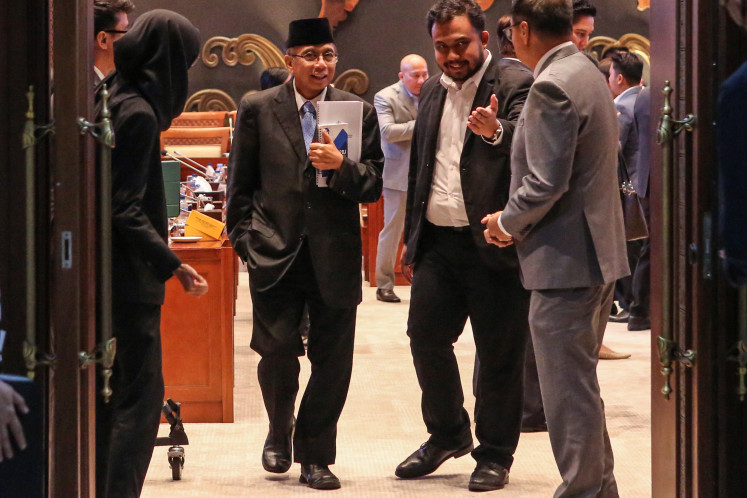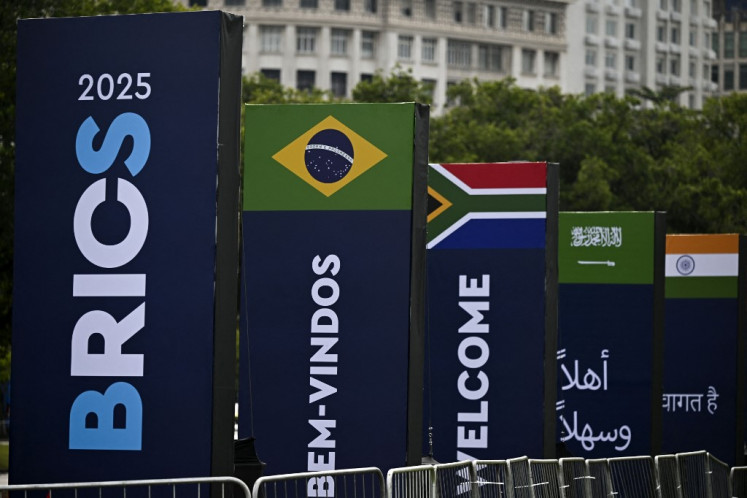Popular Reads
Top Results
Can't find what you're looking for?
View all search resultsPopular Reads
Top Results
Can't find what you're looking for?
View all search resultsMystic protection for tourists in Sanur
Maintaining balance: Hotel employees carry the mask of Ratu Byang in a procession along the beach in Sanur, sacred objects, offerings of braided palm leaves and frangipani blossoms as well as spears of steel
Change text size
Gift Premium Articles
to Anyone
M
a href="http://">Maintaining balance: Hotel employees carry the mask of Ratu Byang in a procession along the beach in Sanur, sacred objects, offerings of braided palm leaves and frangipani blossoms as well as spears of steel. Most guests at the Inna Grand Bali Beach Hotel in Sanur do not realize they are under the protection of a sacred mask representing the deity Rangda.
Like other sacred masks in Bali it is given a special place in a traditional temple shrine, but unlike other ritual objects, this one lives in a hotel.
The temple in which it resides, Pura Manik Tirtha Sari, is on the hotel grounds, and maintained by the management with the same ceremonies conducted at other Balinese temples.
The Rangda mask is known to the hotel staff as Ratu Byang or “Queen Mother.” When it was unveiled for a ritual procession at the beginning of this month, over 100 employees turned out to accompany the mask on a march around the hotel grounds.
Though foreigners might be intimidated by Rangda’s bulging painted eyes and the fire-red tongue that hangs from between its curved fangs, the Balinese participants in the event were enchanted by the mask’s mystical beauty, which was recently enhanced by restoration work that included three months of ceremonies, repainting, and other embellishments.
“Isn’t she beautiful,” murmured a young woman who had changed from her hotel uniform into traditional Balinese temple clothes to join the festivities.
The staff’s pride in the mask’s new appearance may be linked to the fact that dozens of the hotel’s workers participated in the restoration process.
For three months on the night of the full moon employees traveled to Ubud to help beautify their Ratu Byang. The final painting was done by master artist Cokorda Raka Sukawati, but everyone had the opportunity to contribute a few dabs of paint to Rangda’s renovation.
“No matter how small the contribution,” said the hotel’s general manager Sugeng Pramono, “I wanted everyone to feel that the mask belongs to us all.”
He demonstrated with a drawing how one employee had painted the mask’s eyebrow, while another touched up the nose, and still another added a touch of “lipstick”.
One of the many ceremonies performed to insure that the spiritual power of the mask remained intact during its renewal required a trip to Pura Gulingan, the temple in Mengwi where the mask was originally consecrated.
Mystical powers: A myriad of offerings are placed in front of Ratu Byang, the sacred mask of Rangda, at the Pura Manik Tirtha Sari temple located in the grounds of the Inna Grand Bali Beach Hotel in Sanur, Bali.“We had to find the ‘pole’ tree where the wood for the original mask was first cut, so that the new wood would be related to the old wood,” said Gusti Widjaya, who worked at the hotel when it first opened in 1966. He returned from retirement to supervise the mask’s renewal.
“I am part of the new generation,” explains Sugeng, “but I want to follow the advice of the older generation, so that we can keep the hotel’s traditions alive in a way that lives up to the Balinese concept of Tri Hita Karna.”
Tri Hita Karna is a principle that encourages individuals to maintain balanced relationships with the gods, their fellow humans, and their natural environment. The ceremonial circling of the hotel grounds demonstrated the power of Tri Hita Karna in action.
At the center of the procession was the mask of Ratu Byang, initially balanced on the head of Dewa Putra, who works in the hotel’s marketing department. Bearing a ritual object on one’s head is known in Balinese as sesuhanan and it is a physical manifestation of one’s respect for the sacred entities that inhabit the object.
This act of devotion was reinforced by the collaboration of other employees who carried sacred objects in front of Rangda and behind her. Leading the way were two towering bamboo poles festooned with dragon banners. Women carried offerings of braided palm leaves and frangipani blossoms. Men carried spears of steel. A marching band of cymbals, gongs and drums gave a vibrant musical display of syncopated human synchrony.
At each crossroads the procession stopped, and offerings were made that linked Rangda’s mystical powers to the local environment with incense, mantras, and flowers.
Prayer time: A priest and a helper perform a special prayer for Rangda. A bond was created between the ritual participants, the mask, and the environment that was not limited to the sand, the sea, and the trees of Sanur, but also included the golf course, the parking lot, and the souvenir shops that are part of the hotel’s surroundings. Tourist buses chugged by the small ceremonies conducted for Rangda at the hotel’s main entrances, and the neon lights of Dunkin Donuts and Kentucky Fried Chicken were only a few meters away from the procession’s path, but no modern distractions could diminish the spiritual energy generated by the lyrical chants, sweet fragrances, and physical grace of the ensemble that honored Rangda’s renewal.
The mask and its followers made a circle of several kilometers around the Grand Bali Beach, shrouding the grounds in an invisible shield of ritual protection.
“This is the only hotel in Bali with it’s own Rangda and everyone here feels its spirit,” says Sugeng who took over the general manager job in 2009 with the goal of renovating the hotel on many levels.
Although Sugeng is a Muslim who was born in Surakarta, Central Java, he makes it a priority to support the ritual activities that integrate the hotel with its Hindu community.
“Our general manager is an Anak Java,” says Ibu Gusti Ayu Ariani, part of the management team, “but that doesn’t stop him from helping us to make a ceremony that we call the reincarnation of Ratu Byang. We might also call it the reincarnation of our hotel.”
— Photos by JP/Ron Jenkins
The writer is the visiting professor of theater at Wesleyan University, the US, who is currently on
projects to preserve ancient lontar and Balinese traditional theater performances.












